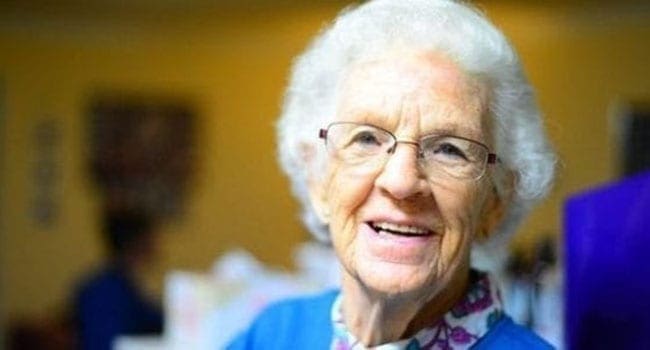By Ruta Valaitis
and Maureen Markle-Reid
McMaster University
Despite having diabetes and arthritis, Verne was a thriving independent 72-year-old who lived at home with his wife when he had a stroke. He had excellent emergency care in the hospital and began his recovery there. But he didn’t adjust well after arriving home. He started to show signs of depression and was at risk of re-hospitalization.

Ruta Valaitis
Verne feared he would have another stroke as he waited for follow-up appointments with neurology, physiotherapy and speech pathology. He had difficulty remembering to take his new medications and adapting to using a walker.
Transitioning home from hospital is challenging for older adults with multiple chronic conditions. Home-care services are often not available or inadequate. And followup care from doctors or specialists is too often infrequent or involves juggling multiple appointments over long wait periods.
Add to this the challenge of managing complex health conditions and the risks for depression and recurring poor health and hospitalization are high.

Maureen Markle-Reid
Unfortunately, Verne’s experience is not uncommon.
The 2016 State of Seniors Health Care in Canada report from the Canadian Medical Association (CMA), highlights a key problem: our medicare system was established to deal largely with acute, episodic care for a relatively young population.
Today, our system struggles to care properly for patients managing multiple ongoing health issues. We know older adults with chronic conditions need more health services and have a higher risk of hospitalization compared to those with a single chronic condition.
Adults 65 years and older are the fastest growing age group in the country. In Ontario, 16.7 per cent, in British Columbia and Quebec 18.3 per cent, and in Nova Scotia 19.9 per cent of the population is 65 years or older.
| RELATED CONTENT |
| Headband may help diagnosis of stroke patients By Katie Willis |
| Clot-busting drug used for heart attacks effective in treatment of stroke By Michael Brown |
| New devices could prevent a significant number of disabling strokes By Ross Neitz |
Multiple chronic conditions among older adults are increasing. Approximately 75 to 80 per cent of Canadian seniors report having one or more chronic condition, such as diabetes, asthma, arthritis, high blood pressure, mood disorder and chronic obstructive pulmonary disease (COPD).
Like Verne, these patients face several challenges in managing their conditions. A lack of care co-ordination amongst health professionals combined with low health literacy gets in the way. Their care is piecemeal and fragmented, with little focus on the patient and family as a whole. Limited financial resources to cover the costs of supplies, additional care and transportation also create barriers to self-management.
These seniors often experience loneliness. Their family caregivers often lack support. Managing multiple, often interacting medications is also difficult.
So what can be done? We asked seniors to find the answers.
As researchers with the Aging, Community and Health Research Unit at McMaster University, we’re working with older adults with multiple chronic conditions and their family caregivers to promote optimal aging at home.
Community Assets Supporting Transitions (CAST) is a new hospital-to-home transitional care program in Sudbury, Burlington and Hamilton that aims to reduce depressive symptoms, improve patients’ quality of life and self-management ability, and support family caregivers. CAST is delivered by registered nurses who support patients transitioning from hospital to home over a six-month period through in-home visits, telephone follow-up and care co-ordination.
There’s also a community-based diabetes self-management program in Ontario, Quebec and P.E.I. that was developed for older adults with diabetes and multiple chronic conditions. The program includes monthly wellness sessions, and a series of home visits with a registered nurse and a registered dietitian. They work as a team with staff and volunteers from seniors centres or YMCAs to deliver a health promotion program for participants.
We’ve also been creating a new way of providing outpatient stroke rehabilitation services for older adults with stroke and multiple chronic conditions living in the community. We provide regular in-home visits for the patient and monthly interprofessional care conferences for the providers. We also developed a new web-based app, MyST (My Stroke Team), to support communication and collaboration among the interprofessional stroke team.
Clearly, the status quo isn’t meeting the needs of our aging population and fails to provide quality care for seniors. Creating innovative pilot projects to improve the transition from hospital to home will help us provide a better system that’s both more efficient and cost-effective, and will improve the standard of care to seniors like Verne.
Dr. Ruta Valaitis is a professor McMaster University School of Nursing, the Dorothy C. Hall Chair in Primary Health Care Nursing and co-scientific director of the Aging, Community and Health Research Unit. Dr. Maureen Markle-Reid, is a professor McMaster University School of Nursing the Canada Research Chair in Person-Centred Interventions for Older Adults with Multimorbidity and their Caregivers and co-scientific director of the Aging, Community and Health Research Unit.
For interview requests, click here.
The opinions expressed by our columnists and contributors are theirs alone and do not inherently or expressly reflect the views of our publication.
© Troy Media
Troy Media is an editorial content provider to media outlets and its own hosted community news outlets across Canada.

